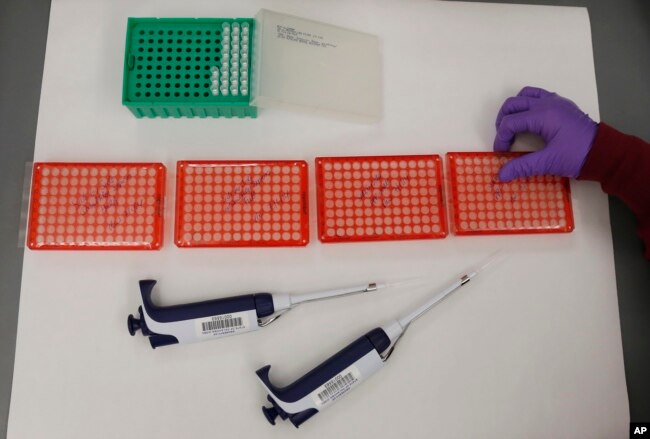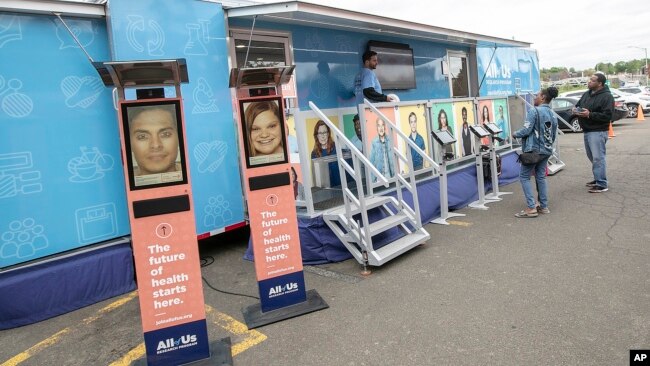アンジェリーナ・ジョリーの話はあまりに有名です。
知ったから、どうするかは個人の問題ですが。
遺伝子検査もここまで手軽になったのですね。
このアメリカの取り組み、いいですよ!!
VOAで英語を学びましょう!!
米国の大規模研究、遺伝子に関する知見をボランティアと共有開始(和訳)
Huge US Study Starts Sharing Gene Findings with Volunteers
December 18, 2022
DNAは、生物の細胞内で遺伝情報を伝える主要な分子です。科学のために自分のDNAを共有した15万5千人以上のアメリカ人は、お返しに何かを学ぼうとしています:心配な遺伝子はあるのか?
これは、人々の遺伝、環境、行動がどのように組み合わさって全体的な健康を支配しているかを調べる、非常に大規模な研究の一部です。
米国国立衛生研究所(NIH)は最近、この研究の参加者にいくつかの初期所見を伝え始めていると言っています。例えば、遺伝的に受け継がれる59の病気の原因となる変異体を持っているかどうか、あるいは投薬の問題を引き起こす可能性があるかどうかなどです。
同じ遺伝子を持つ人が皆同じ健康状態になるとは限らないので、これらの結果を共有することは新しい発見を意味するかもしれません。
ジョシュ・デニー博士は、NIHの "All of Us "と呼ばれる研究を率いています。彼は、「そのばらつきの原動力は何か?」と問いかけます。そして、「その発見に対して、彼らがどのように行動を変えるのか、それを見ることができるでしょう 」と付け加えています。
All of Us研究は、医療の格差をなくし、今日の画一的な医療を終わらせるための、a never-before-seenこれまでにない取り組みです。研究者たちは、異なるグループの100万人の人々を少なくとも10年間追跡調査することを目標としています。その目的は、ある子供は病気になるが別の子供はならない、ある患者の治療が別の患者では失敗する、といった複雑な理由の組み合わせをよりよく理解することです。
ボランティアは、DNAサンプル、医療記録、健康歴を共有します。これまでに約56万人がサインアップしています。さらに重要なことは、その半数近くが、歴史的に医学研究から取り残されてきた人種や民族の人々であるということです。
従来、こうした研究は一方通行のようなものです–科学者はボランティアから多くを学び、見返りとして個人情報をほとんど得ることができないのです。しかし、異例なことに、All of Usのボランティアは、研究が終了するずっと前に、健康に関連する遺伝子の知見を知りたいかどうかを決めることができるのです。
レイチェル・ピーターソンさんはNIHの職員で、All of Usにボランティアとして参加した後、最近このプロジェクトの主要メンバーになりました。All of Usの遺伝カウンセラーが彼女に、BRCA-2という遺伝子のために乳癌と ovarian cancer卵巣癌のリスクが高いことを伝えました。
ピーターソンは、それが自分の家族のリスクであることを知りませんでした。彼女は、乳がん検診を増やすなど、健康法について主治医と話し合う予定です。彼女は、「これを知らなかったらどうなっていたかと思うと、ちょっとぞっとします」と言います。
デニー博士は、研究ボランティアの2〜3パーセントが、いくつかの癌、心臓病、その他の健康問題の原因となりうる有名な遺伝子変異を持っていることを知ると推定しています。さらに多くの人が、体内での薬物処理に影響を与える遺伝子変異を持つことになります。
今のところ、ボランティアは、早めの検査を受けるとか、薬を変えるとか、何かできることがある場合にのみ、その結果を知らされます。ボランティアには、無料の検査、遺伝カウンセリング、医師や家族との情報共有のサポートが提供されます。
しかし、まだまだ学ぶべきことはたくさんあります。例えば、病気と関連する遺伝子の多くは、ヨーロッパ人の祖先を持つ人々を研究することによって発見されました。
ベイラー医科大学のエリック・ヴェナー氏は遺伝学の専門家です。彼によれば、異なる変異型が他の家系に影響を与える可能性があるとのことです。彼のチームは、All of Usのデータを研究して、どの違いがどの集団に最も重要であるかを調べています。
デニー氏は、何十年も一緒に研究できるボランティアに話を聞くことができることの力について、こう述べています。新しい知見がボランティアに影響を与えるのであれば、「私たちは常に最新の情報を提供するつもりです」とデニー氏は話しています。
Huge US Study Starts Sharing Gene Findings with Volunteers
DNA is the main molecule that carries genetic information in the cells of living things. More than 155,000 Americans who shared their DNA for science are about to learn something in return: Do they have any worrisome genes?
It is part of a very large study to see how people’s genetics, environments, and behavior combine to govern their overall health.
The National Institutes of Health (NIH) said recently it is now starting to tell those in the study about some early findings. Like if they carry variants that can cause any of 59 genetically passed down diseases or cause medication problems.
Because everyone with the same gene will not have the same health outcome, sharing those results may mean new discoveries.
Dr. Josh Denny heads the NIH’s study, called “All of Us.” He asked, “What are the drivers in that variability?” And he added, “The way they change their behaviors in response to the findings, we’ll be able to look at that.”
The All of Us study is a never-before-seen effort to reduce differences in healthcare and end today’s one-size fits all care. Researchers aim to follow 1 million people from different groups for at least ten years. Their goal is to better understand the complex combinations of reasons that decide why one child gets sick and not another, or why a cure for one patient fails in another.
Volunteers share DNA samples, medical records and health history. About 560,000 have signed up so far. And more importantly, nearly half are from racial and ethnic groups historically left out of medical research.
Traditionally, such studies are like a one-way street – scientists learn a lot from volunteers who get little personal information in return. But in an unusual move, All of Us volunteers get to decide if they want to learn health-related genetic findings, long before the study’s finished.
Rachel Peterson is an NIH employee who volunteered for All of Us before recently becoming a leading member of the project. An All of Us genetic counselor informed her that she was at increased risk of breast and ovarian cancer because of a gene named BRCA-2.
Peterson did not know that was a risk for her family. She plans to discuss health treatments with her doctor, such as increased breast cancer screening. She said, “I kind of shudder to think about what could happen if I hadn’t known this.”
Denny estimated two to three percent of study volunteers will learn they have a well-known genetic variant that can cause some cancers, heart conditions, or other health problems. Many more will have genetic variants that affect how their body processes some medicines.
For now, volunteers will only be given findings they can do something about, such as seeking earlier testing, or changing medications. They will be offered free testing, genetic counseling, and help with sharing the information with their doctors and family members.
But there is a lot more to learn. For example, many of the disease-linked genes were discovered by studying people of European ancestry.
Eric Venner of Baylor College of Medicine is a genetics expert. He said different variants may affect other ancestries. And his team is studying the data from All of Us to see which differences matter most to which populations.
Denny commented on the power of being able to talk to volunteers who they could work with for tens of years. If new findings affect study volunteers, “we’re going to keep things up to date,” Denny said.
Words in This Story
variant – n. something that is different in some way from others of the same kind
response – n. something that is done as a reaction to something else
sample – n. a small amount of something that gives you information about the thing it was taken from
counselor – n. a person who provides advice as a job
ovary – n. one of usually two organs in women and female animals that produce eggs and female hormones
shudder – v. to shake because of fear or cold

